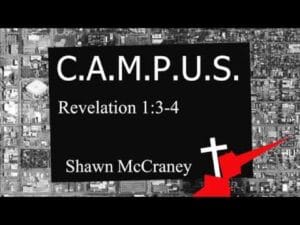
Revelation 1:13-20 Bible Teaching
Shawn's teaching on Revelation 1:13-18 highlights Jesus' divine attributes, linking Old Testament imagery to His exalted state, emphasizing His role as King, High Priest, and divine judge.

Shawn's teaching on Revelation 1:13-18 highlights Jesus' divine attributes, linking Old Testament imagery to His exalted state, emphasizing His role as King, High Priest, and divine judge.

Paul and Barnabas preached powerfully, faced opposition, and performed miracles. Shawn teaches on God's message confirmation, spiritual fruit, and purposeful division.

Paul's message in Acts 13 highlights justification through faith in Jesus, contrasting the Law of Moses. Despite Jewish opposition, Gentiles embraced it, expanding the Gospel.

Shawn reevaluates John's exile to Patmos, suggesting it was for missionary work, not persecution. He challenges traditional dating of Revelation, emphasizing internal biblical evidence over early church traditions, and proposes an early authorship date.

Paul's teaching highlights Jesus as the Savior, fulfilling God's promise to Israel. Through Jesus' resurrection, salvation extends to all, transcending the Law of Moses.

Shawn's teaching explores "Alpha and Omega" as symbols of God's eternal nature, Jesus' divine authority, and the transition from the Old to New Covenant, emphasizing a preterist view.

Paul and Barnabas's encounter with Sergius Paulus led to belief after Elymas's blinding. Paul preached Jesus as Savior in Antioch, highlighting Israel's history and David's faith.

The teaching highlights the spiritual cleansing power of Jesus' blood, believers' elevated status as "ekklesia," the immediacy of Christ's return, and translation nuances in Revelation.

Shawn's teaching highlights the blessing of engaging with Revelation, explores interpretations of "seven spirits," emphasizes God's eternal nature, and Jesus' authority and redemptive role.

Shawn's teaching highlights the Holy Spirit's role in guiding early Christians, ordination as separation, the importance of prayer, and the transformative Truth of Jesus. Paul confronts Elymas, showing divine insight and temporary judgment, emphasizing corrective, not permanent, punishment.